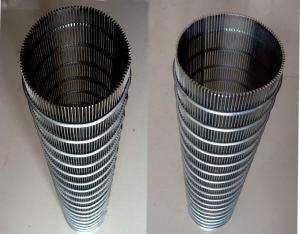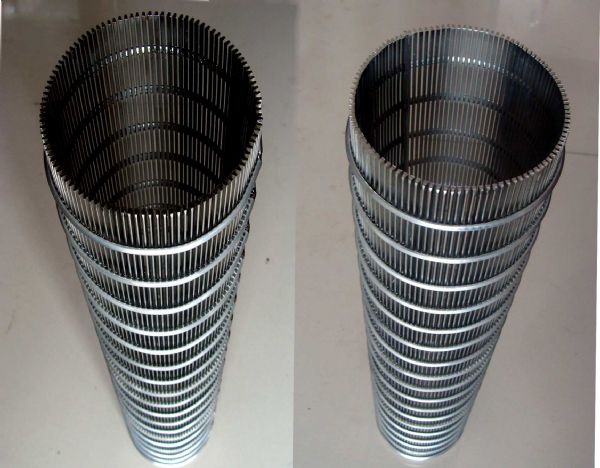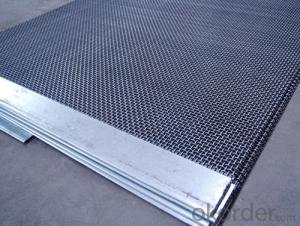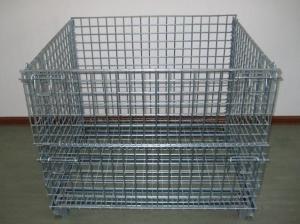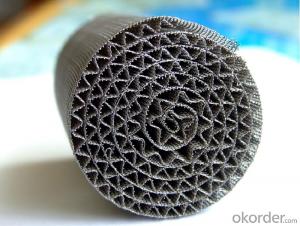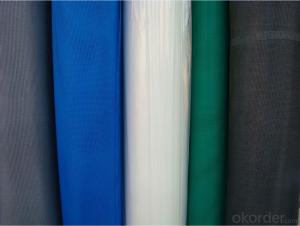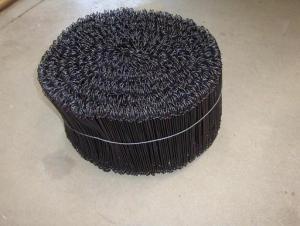Wire Wound Screen Pipe
- Loading Port:
- Tianjin
- Payment Terms:
- TT OR LC
- Min Order Qty:
- -
- Supply Capability:
- 20000 m.t./month
OKorder Service Pledge
Quality Product, Order Online Tracking, Timely Delivery
OKorder Financial Service
Credit Rating, Credit Services, Credit Purchasing
You Might Also Like
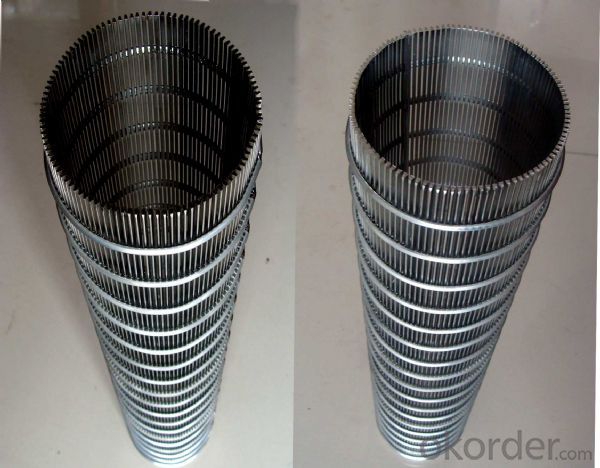
Product Descriptions :Wire Wound Screen Pipe
Product name: welded-wire wound screen
Welded-wire wound screen is widely used in the world in the oil, gas and water wells sand industry, its position in the water well industry, particularly, is a variety of water resource filter screen in one of the most widely used.
Realtime screen use of advanced welding production process around the world, specially made ladder wire winding is arranged in a circle on a group of supporting wire welded together.Whole process welding to ensure the products strictly for the whole, so as to enable it to form the ideal aperture size, and the maximum amount subject to high pressure performance.
Different segments of the production by the professional production personnel using advanced sophisticated equipment for production. Product specifications and raw materials can be custom-made according to customer requirements, reference SY/T 5182-2008 standard all of our products are strictly for production testing to ensure product quality, so as to ensure the interests of our customers, in the most economical input for maximum production efficiency.
Product characteristics and advantages:
1 application, trapezoidal thread, to form a Vee-shaped opening the screen cracks. The design forms more efficiently than other forms of product operation, ensuring the smooth water filter.
2, trapezoidal wire winding is arranged in a circle on a bracing wire formation of high-density uniform gaps, ensure that the open area of the screen and non-obstructive, and avoiding the accumulation of sediments of high density, to increase productivity and extend the life of the wells provide a guarantee.
With all support 3, wire wound through welding the connection between wires, strong and durable, longer life cycle.
4, according to the actual needs of supporting wire vertically and continue the screen cracks form, makes the products with higher compression performance.
5, the advantages of the product life cycle performance improvement the efficiency of wells and, making the product a leader in water filtration equipment.
Note: 1. The products can be customized according to the actual needs of customers of different sizes and materials (mainly in both stainless steel and carbon steel) to ensure that reasonable ruitai investment, save production costs.<
2. screen connections can also be made according to different needs.
3. non-stainless steel products can be handled through the spraying of galvanized or plastic form a protective layer. Attractive and clean.
4. customers may want to make a package.
5. the product is widely used in the oil and gas industry, chemical, paper and water treatment industries.
- Q: What is the difference between steel pipe and fiberglass pipe?
- Steel pipe and fiberglass pipe differ in terms of material composition, durability, flexibility, and cost. Steel pipe is made of steel, which provides strength and resilience, making it ideal for high-pressure applications and underground installations. Fiberglass pipe, on the other hand, is composed of reinforced plastic fibers, resulting in a lightweight and corrosion-resistant material suitable for above-ground and corrosive environments. While steel pipe offers higher tensile strength, fiberglass pipe excels in its flexibility, allowing for easier installation and reduced maintenance. Additionally, steel pipe is typically more expensive due to the cost of materials and manufacturing processes, while fiberglass pipe is more cost-effective in terms of initial installation and long-term maintenance.
- Q: Can steel pipes be used for underground sewerage systems?
- Indeed, underground sewerage systems can make use of steel pipes. These pipes possess remarkable strength and durability, rendering them suitable for the transportation of sewage beneath the surface. Their resistance to corrosion is high, allowing them to withstand the pressure and weight of the soil above. Moreover, steel pipes boast an extended lifespan and exhibit resilience against environmental factors like moisture, chemicals, and temperature variations. Furthermore, the ease of welding steel pipes makes the process of installation and repairs more convenient. Nevertheless, it is crucial to ensure that these steel pipes are adequately coated or lined to prevent corrosion and comply with local regulations and standards pertaining to underground sewerage systems.
- Q: How are steel pipes tested for leaks?
- Steel pipes are tested for leaks using various methods, including hydrostatic testing and ultrasonic testing. In hydrostatic testing, the pipes are filled with water or another suitable fluid and subjected to high pressure to check for any leakage. Ultrasonic testing involves using high-frequency sound waves to detect any defects or leaks in the pipes. These testing methods ensure the integrity and reliability of steel pipes.
- Q: What is the maximum temperature and pressure that steel pipes can withstand?
- The maximum temperature and pressure that steel pipes can withstand depend on various factors such as the grade of steel, wall thickness, and intended application. However, in general, steel pipes can typically withstand temperatures up to 1000-1200°C (1800-2200°F) and pressures ranging from 1000-5000 psi (6.9-34.5 MPa). It is important to consult specific industry standards and engineering guidelines for accurate information based on the specific steel grade and application.
- Q: How are steel pipes insulated for thermal efficiency?
- Steel pipes are insulated for thermal efficiency by adding a layer of insulation material around them. This insulation helps to reduce heat transfer through the pipes, preventing energy loss and maintaining the desired temperature.
- Q: Can steel pipes be used for firefighting systems?
- Indeed, firefighting systems can utilize steel pipes. Steel pipes are frequently chosen for their robustness and ability to endure high temperatures, making them ideal for transporting water and other fire-suppressing agents. Typically, these pipes are employed in larger commercial or industrial structures that necessitate a larger flow rate and pressure for their fire protection systems. Additionally, steel pipes possess the benefit of withstanding external forces and impacts, thus ensuring the integrity of the firefighting system. Moreover, steel pipes offer the convenience of easy connection, simplifying installation and maintenance procedures. Nonetheless, it is crucial to ensure that the steel pipes employed in firefighting systems undergo appropriate treatment to prevent corrosion and rusting, as these factors may compromise their effectiveness during emergency situations. Regular inspections and maintenance are necessary to guarantee the reliability and functionality of the steel pipes within the firefighting system.
- Q: Can steel pipes be used for underground drainage systems?
- Yes, steel pipes can be used for underground drainage systems. Steel pipes are durable, strong, and resistant to corrosion, making them a suitable choice for underground applications. They can effectively handle the flow of water and withstand the pressure of soil and external elements. However, it is important to ensure proper insulation and anti-corrosion measures are in place to protect the steel pipes from potential damage caused by moisture and chemical reactions.
- Q: What are the different surface finishes available for steel pipes?
- There are several different surface finishes available for steel pipes, including mill finish, galvanized finish, painted finish, and polished finish.
- Q: What are the different types of steel pipes available in the market?
- There are several different types of steel pipes available in the market, each designed for specific purposes and applications. Some of the most common types include: 1. Carbon Steel Pipes: These are the most widely used type of steel pipes, known for their strength and durability. They are primarily used for transporting fluids and gases in various industries such as oil and gas, construction, and plumbing. 2. Alloy Steel Pipes: These pipes are made by combining different metals, such as chromium, nickel, or molybdenum, with carbon steel. Alloy steel pipes offer enhanced strength, corrosion resistance, and heat resistance. They are often used in high-pressure applications, such as in power plants and chemical plants. 3. Stainless Steel Pipes: Stainless steel pipes are highly resistant to corrosion and oxidation, making them suitable for applications where hygiene and durability are crucial. They are commonly used in industries like food processing, pharmaceuticals, and water treatment. 4. Galvanized Steel Pipes: These pipes are coated with a layer of zinc to protect them from rust and corrosion. Galvanized steel pipes are commonly used in plumbing systems and outdoor structures, such as fences and handrails. 5. Seamless Steel Pipes: Seamless pipes are produced without any welding or joints, resulting in a smooth and continuous surface. They are known for their high strength and are often used in high-pressure applications. 6. Welded Steel Pipes: Welded pipes are made by rolling or bending a flat steel plate into a cylindrical shape and then welding the edges together. They are commonly used in industries such as construction, oil and gas, and automotive. 7. ERW (Electric Resistance Welded) Steel Pipes: ERW pipes are made by passing a high-frequency electrical current through the steel strip, causing it to heat and form a weld. They are widely used in various applications, including plumbing, water wells, and structural support. 8. LSAW (Longitudinal Submerged Arc Welded) Steel Pipes: LSAW pipes are made by bending and welding steel plates into a cylindrical shape. They are commonly used for transporting large volumes of oil, gas, or water over long distances. These are just a few examples of the diverse range of steel pipes available in the market. The choice of the right type of steel pipe depends on factors such as the intended application, environmental conditions, and budget considerations. It is important to consult with experts or professionals to determine the most suitable type of steel pipe for a specific project or application.
- Q: What are the different types of steel pipe nipples?
- There are several different types of steel pipe nipples that are commonly used in various applications. These types include seamless, welded, threaded, and grooved steel pipe nipples. 1. Seamless steel pipe nipples: Seamless nipples are manufactured from a solid piece of steel without any seams or joints. This type of nipple is often preferred for high-pressure or critical applications due to its superior strength and reliability. Seamless nipples can be threaded or plain-ended, depending on the specific requirements. 2. Welded steel pipe nipples: Welded nipples are made by joining two or more pieces of steel together through welding. This type of nipple is commonly used in non-critical applications where high pressure is not a concern. Welded nipples are available in both threaded and plain-ended options. 3. Threaded steel pipe nipples: Threaded nipples have external threads at one or both ends, allowing them to be easily connected to other threaded fittings or pipes. These nipples are commonly used in plumbing, water supply systems, and other applications where a secure and leak-free connection is essential. Threaded nipples are available in various lengths and diameters to accommodate different requirements. 4. Grooved steel pipe nipples: Grooved nipples have a groove or indentation around the circumference of the nipple, which allows for easy installation using grooved couplings. This type of nipple is commonly used in fire protection systems, HVAC systems, and other applications where quick and efficient installation is necessary. Grooved nipples are available in various sizes and configurations to suit different piping systems. In summary, the different types of steel pipe nipples include seamless, welded, threaded, and grooved nipples. Each type has its own advantages and is suitable for specific applications. It is important to consider the specific requirements and conditions of the project before selecting the appropriate type of steel pipe nipple.
Send your message to us
Wire Wound Screen Pipe
- Loading Port:
- Tianjin
- Payment Terms:
- TT OR LC
- Min Order Qty:
- -
- Supply Capability:
- 20000 m.t./month
OKorder Service Pledge
Quality Product, Order Online Tracking, Timely Delivery
OKorder Financial Service
Credit Rating, Credit Services, Credit Purchasing
Similar products
Hot products
Hot Searches
Related keywords
